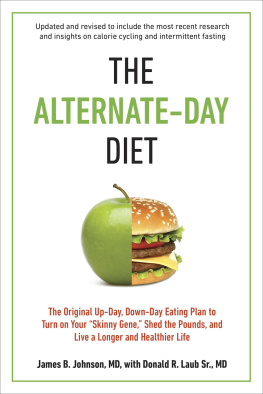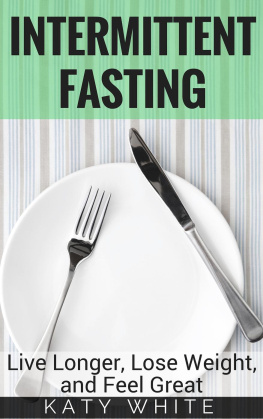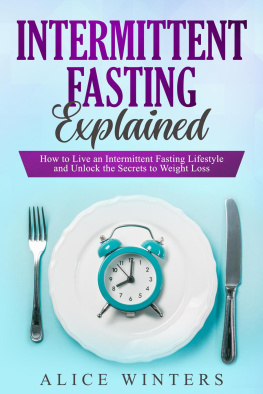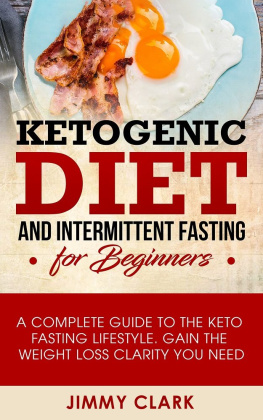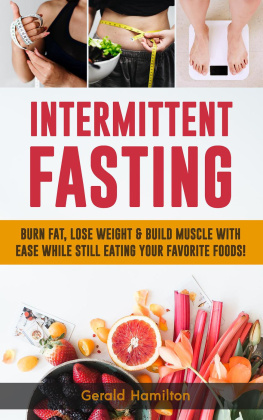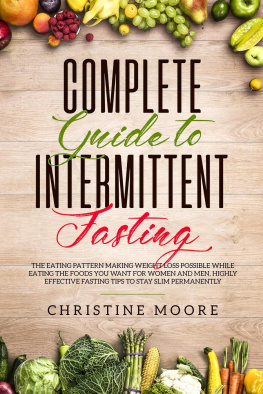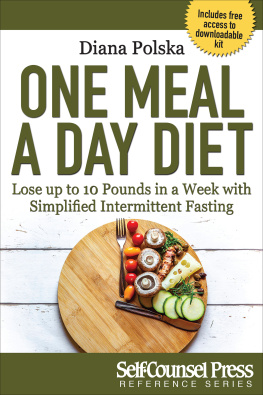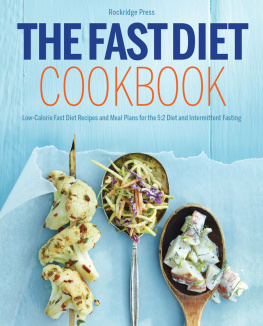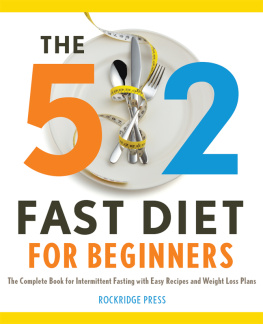Diet only half the time... but get twice the results!
A variation [on periodic fasting] that also may lead to weight loss is restricting calories on alternate days. In a small study published in March, researchers followed a group of ten people with a body mass index above 30 who were fed just 20 percent of their normal calorie intake on alternate days. On the other days they could eat what they wanted. After eight weeks, theyd lost an average of 8 percent of their body weight. These people were also asthma patients, and their symptoms also improved significantly after two weeks on the regimen.
US News & World Report
Discover the breakthrough technique that allows you to activate your skinny gene and enjoy these remarkable and measurable benefits:
Lose fat easily and quickly without deprivation, discomfort, or stress.
Improve fat metabolism.
Avoid regaining lost fat.
Slow the aging process.
Optimize nutrition.
Reduce by as much as 90 percent the primary cause of inflammatory disease.
A PERIGEE BOOK
Published by the Penguin Group
Penguin Group (USA) LLC
375 Hudson Street, New York, New York 10014

USA Canada UK Ireland Australia New Zealand India South Africa China
penguin.com
A Penguin Random House Company
Copyright 2013 by Up Day Down Day Diet LLC
Up Day Down Day Diet is a trademark of Up Day Down Day Diet LLC
Penguin supports copyright. Copyright fuels creativity, encourages diverse voices,
promotes free speech, and creates a vibrant culture. Thank you for buying an authorized
edition of this book and for complying with copyright laws by not reproducing, scanning,
or distributing any part of it in any form without permission. You are supporting writers
and allowing Penguin to continue to publish books for every reader.
PERIGEE is a registered trademark of Penguin Group (USA) LLC.
The P design is a trademark belonging to Penguin Group (USA) LLC.
Revised Perigee trade paperback ISBN: 978-0-399-16703-4
The Library of Congress has cataloged the Perigee hardcover edition as follows:
Johnson, James B., MD.
The alternate-day diet : turn on your skinny gene, shed the pounds, and live a longer and healthier life /
James B. Johnson with Donald R. Laub.
p. cm.
ISBN 978-0-399-15493-5
ISBN 978-0-698-14907-6 (eBook)
1. Reducing diets. 2. NutritionGenetic aspects. 3. Low-calorie diet.
I. Laub, Donald R. II. Title
RM222.2.J554 2008 2008005400
613.2'5dc22
PUBLISHING HISTORY
G. P. Putnams Sons hardcover edition / April 2008
Perigee trade paperback edition / April 2009
Revised Perigee trade paperback edition / January 2014
Neither the publisher nor the author is engaged in rendering professional advice or services to the individual reader. The ideas, procedures, and suggestions contained in this book are not
intended as a substitute for consulting with your physician. All matters regarding your health
require medical supervision. Neither the author nor the publisher shall be liable or responsible
for any loss or damage allegedly arising from any information or suggestion in this book.
The recipes contained in this book are to be followed exactly as written. The publisher is not responsible for your specific health or allergy needs that may require medical supervision.
The publisher is not responsible for any adverse reactions to the recipes contained in this book.
While the author has made every effort to provide accurate telephone numbers, Internet addresses, and other contact information at the time of publication, neither the publisher nor the author assumes any responsibility for errors, or for changes that occur after publication. Further, the publisher does not have any control over and does not assume any responsibility for author or third-party websites or their content.
Version_1
To Dana and Judy, for suffering along with us
Contents
Why This Diet?
I have struggled most of my life to maintain a healthy weight. As a plastic surgeon performing liposuction, I have counseled thousands of patients about their weight. Until a few years ago, however, my advice appeared to be inadequate, because very few of my patients lost weight and kept it off. Then, in 2003, I had a weight-loss epiphany. I read about an experiment done on some fat mice at the National Institutes of Health that changed my life.
If youre having trouble controlling your own weight, you may be at least somewhat relieved to know that there is significant scientific research showing that fewer than 10 percent of Americans can eat freely, without restraint, and not gain weight. Sixty-five percent of us either dont restrain or try unsuccessfully, and are, therefore, overweight or obese. That leaves approximately 25 percent of the population who, presumably, restrain successfully and avoid gaining weight.
Since youre reading this, I assume you belong to that 65 percent who fall prey to the fatal attraction of food. If so, you should know that I am just like you. I love to eat food that tastes good and I used to be hungryor at least thought I was hungryvirtually all the time.
Thats really not so surprising if you consider that when our hunter-gatherer ancestors roamed the earth they truly never knew where their next meal was coming from, and so, whenever there was food available, they ate it. Those who hunted or gathered and ate the most survived, and gradually, over time, that eat-whatever-you-can-whenever-you-can survival instinct was programmed into our DNA. It became part of our genetic code. Now, of course, theres no shortage of food. Good, tasty, inexpensive food is available to all of us in abundance all the time. And our DNA is telling us to eat it.
Going on a diet is, therefore, going against everything our genes are telling us we need to do to survive. In her book Rethinking Thin , Gina Kolata, a science writer for the New York Times , looks at the plethora of evidence indicating that some people are more genetically predisposed than others to be overweight and concludes that those who are genetically destined to be fat may be incapable of losing a significant amount of weight and keeping it off. But she also writes that the genes that make people fat need an environment in which food is cheap and plentiful, and that is exactly the environment in which we live today. Moreover, if genetics were solely responsible for the epidemic of overweight people in America, it would mean that 65 percent of the population had been born with some kind of rogue fat gene, and there doesnt appear to be any evidence thats true.
When I was a child, my parents had a cabin in northern Michigan where we went for weekends. On the drive home one Sunday we stopped at a place called McDonalds. The hamburgers were tiny, but the french fries and shakes were (and still are) the best Id ever had. From that day on, stopping at McDonalds became the highlight of my entire weekend. In those days, however, McDonalds locations were few and far between; today it seems theres one on almost every corneralong with Wendys, Burger King, Dunkin Donuts, Cinnabon, and thousands of other inexpensive, really tasty, fattening fast-food outlets. Given the combination of our hardwired disposition to eat and a landscape literally littered with tasty food, its no wonder that, according to a study published in the Journal of the American Medical Association , the obesity rate for adults doubled between 1980 and 2002.

